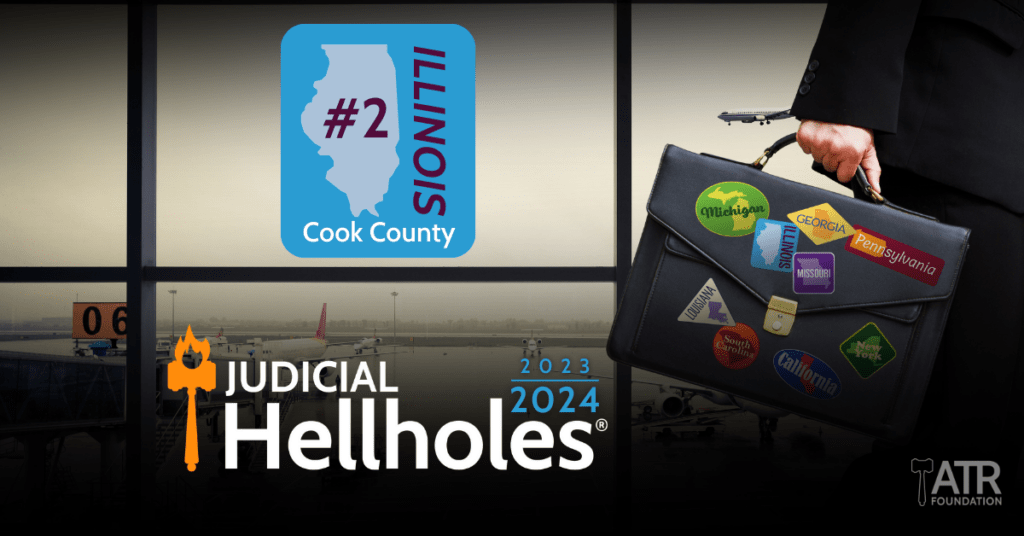‘Highly Unusual’ Rehearing of Louisiana Case Raises Judicial Independence Concerns
Louisiana Supreme Court Waffles Under Political Pressure, ATRA Brief Urges Court to Stand Strong

Cook County Legal Woes Exposed: No-Injury Lawsuits, Excessive Verdicts, Business Struggles
In a sobering declaration, the American Tort Reform Foundation identified Cook County, Illinois, as the No. 2 Judicial Hellhole® in its latest report — the county’s highest ranking in more than a decade.
This ranking, released today, paints a grim picture of challenges in the county’s legal system this year. ATRF based its 2023-2024 designation on factors including data privacy lawsuit abuses, surging “no-injury” lawsuits, and worrisome liability-expanding legislation.
Data reveals that Chicago residents pay a “tort tax” of more than $2,320 each year, while across the state, more than 200,000 jobs are lost every year due to excessive tort costs.
This year, the Illinois Supreme Court handed down rulings in two cases originating in Cook County, affirming the county’s liability-expanding decisions. ATRF says these rulings intensified tribulations businesses face under the state’s Biometric Information Privacy Act. First, the Court expanded BIPA’s scope by extending the statute of limitations to five years in Tims v. Black Horse Carriers.
Then, it ruled in Cothron v. White Castle that each individual biometric information scan counts as a separate violation, meaning a single instance of biometric data collection can result in thousands of distinct claims. In the two months following the White Castle decision, which originated in Cook County Circuit Court, BIPA lawsuit filings spiked 65%.
“The White Castle decision will lead to stratospheric levels of damages in BIPA litigation,” Joyce said. “This creates a formidable difficulty for businesses aiming to protect privacy rights while avoiding the financial burden of excessive legal battles. What’s worse, is many BIPA claims don’t actually claim any injury – which is typically necessary to bring a lawsuit.”
Recent data shows there are 1,141 BIPA cases pending in Illinois state and federal courts. Just seven law firms represent nearly 70% of the plaintiffs. In one case, trial lawyers received a nearly $100 million payout while their clients each received less than $430.
“BIPA was well-intended, but now it’s just another tool in the trial lawyer playbook, exploited through abusive litigation,” Joyce said. “While BIPA litigation is lucrative for a few select law firms, it undermines the well-being of middle-class families when Illinois businesses suffer under this law while lawyers profit at their expense.”
Now, ATRF says increased filings in Cook County under the state’s Genetic Information Privacy Act signify a new wave of class action litigation. The law allows for damages between $2,500 and $15,000 for each violation.
Cook County is also a magnet for “no-injury” lawsuits targeting the food and beverage industries, after an alarming 450% surge in these consumer class actions in 2021. Illinois filings remain steadfast, with most cases filed in federal court in the Northern District of Illinois, which includes Cook County. ATRF points to the state’s expansive consumer protection laws as one root cause.
“Cook County unfortunately has become a hub for what can only be described as frivolous lawsuits, particularly in the food and beverage sector,” Joyce said. “Federal judges even question the legitimacy of some claims, as seen in recent dismissals, but this alone will not solve the onslaught of lawsuits and the costs to businesses.”
Also, this year, Democratic Gov. J.B. Pritzker signed a new law raising concerns about increased rideshare prices. The law removed liability protections for rideshare companies, which ATRF says could create significant new costs to companies providing services in Illinois, ATRF says.
“This change not only escalates operational costs for rideshare providers but, more critically, endangers transportation options statewide,” Tiger Joyce, president of the American Tort Reform Association said. “The ripple effect is profound, potentially impacting the earnings and livelihoods of thousands of rideshare drivers across Illinois.”
ATRF also notes the Illinois Trial Lawyers Association’s influence in passing this legislation. ITLA donated more than $400,000 to the sponsors of the rideshare bill.
Another new law allows for limitless punitive damages in wrongful death cases, which ATRF says makes Illinois an outlier when compared with other states. This year’s Judicial Hellholes® report also includes a “Closer Looks” section analyzing the trending expansion of state wrongful death acts.
“The impacts of liability-expanding efforts in Springfield will only exacerbate Cook County’s challenges as a Judicial Hellhole®,” Joyce said. “Instead, this Judicial Hellholes® reputation should be a wake-up call for meaningful reform. Let’s protect hardworking middle-class families and ensure everyone has equal access to justice under the law.”
To learn more about the critical issues shaping Cook County’s legal landscape and the comprehensive Judicial Hellholes® report, visit JudicialHellholes.org.
Louisiana Supreme Court Waffles Under Political Pressure, ATRA Brief Urges Court to Stand Strong
Left unchecked, these jurisdictions will continue dragging down economic growth and undermining justice through rampant lawsuit abuse.
Claimants Given Opportunity to Vote on Plan; Judge to Reconsider Scientific Validity of Plaintiffs’ Experts
Legitimate consumer protection demands sound science and impartial analysis — not distorted data designed to manufacture lawsuits.
Law Firms Spent $168M+ on 2.2M Ads in Georgia
ATRA’s Latest Studies Reveal Financial Influence and Lack of Transparency in Pennsylvania’s Campaign Finance Systems